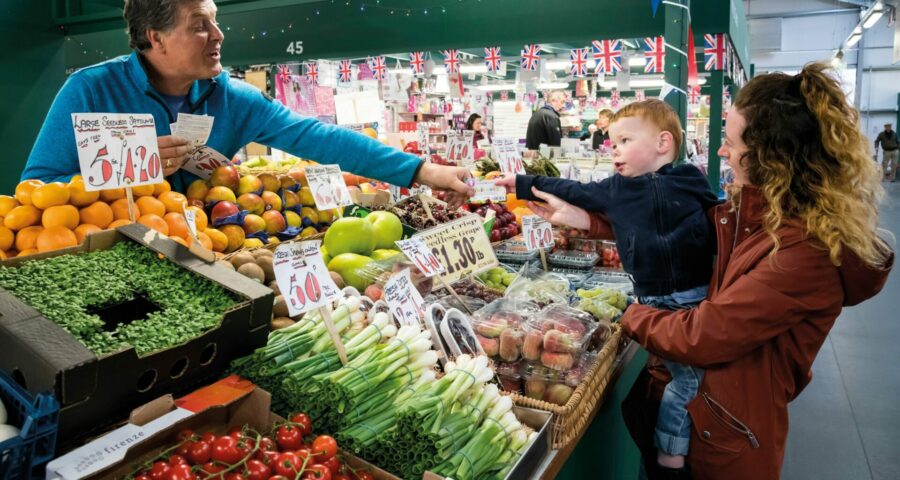Last month, the Government announced the appointment of a Child Poverty Unit responsible for delivering the Child Poverty Strategy promised in Labour’s manifesto.
This announcement comes at a critical time, as the Food Foundation’s latest Food Insecurity Tracker finds that 2.7 million children experienced food insecurity in June 2024. Based upon these latest findings, households with children in the poorest 20% of the population need to spend 70% of their disposable income on food to follow the Government’s healthy eating guidelines. This data highlights how tough it is for families living on low incomes to afford a healthy diet.
At Alexandra Rose Charity, we see first hand the struggles families face in putting healthy food on the table. Anika, who receives Rose Vouchers for Fruit & Veg told us:
It is absolutely horrible. I have four children, from a one-year-old to a fourteen year old. I’m not able to buy what I need and it’s getting worse. Once I pay out all my bills, I’ve got £100 left for the week for everything. My money just can’t stretch to what I need for my children.
It is crucial that the Taskforce listen to stories like Anika’s and include actions in the Child Poverty Strategy that:
1. Support families to afford a healthy diet
We believe that wage and benefit levels should support families to afford basic essentials like food – but this is currently not the case. Laura, who receives Rose Vouchers for Fruit & Veg told us:
It’s a difficult situation. I have nothing left over from Universal Credit after paying for the rent and bills.
What’s more, according to the Living Wage Foundation, the Government’s National Living Wage falls short by £1,092 a year, and by £3,334 a year for workers in London when compared to the real Living Wage, which accurately reflects the cost of living.
The Child Poverty Strategy must commit to actions that take into account the cost of a healthy diet when setting wage and benefit levels.
2. Focus on the early years
We’ve written before about how important it is to invest in interventions that target the early years (from pregnancy to age five). This is a critical time of growth and development, where eating behaviours are established and formed, and track through to adulthood.
The Healthy Start Scheme, a nutrition safety net for pregnant women and families with preschool children, is a lifeline for many families living on low incomes. But the scheme requires much-needed investment to ensure it meets its nutritional objectives and serves those families who need it most.
The Child Poverty Strategy must include actions that maximise the impact of the Healthy Start Scheme including increasing the uptake and value and expanding eligibility.
High-quality early years services that provide families with holistic support have been shown to improve the wellbeing of babies and young children, boost future life chances, and prevent ill-health later in life.
The Family Hubs and Start for Life programme provides funding for 75 local authorities to deliver evidence-based early years services, including a £50 million investment to establish infant feeding support services. However, this funding comes to an end in March 2025.
The Child Poverty Strategy should include a multi-year spending commitment that continues to fund existing Family Hubs and Start for Life programmes and extends this funding to cover all local authorities. It should also be made possible for local authorities to use their Start for Life and Family Hub infant feeding funding to replicate and scale Rose Vouchers for Fruit & Veg projects.
3. Promote a cash first approach
Over 3.1 million emergency food parcels were distributed by food banks in the Trussell Trust network between April 2023 and March 2024 — the most parcels ever distributed by the network in a year. Although food banks provide essential support, their reliance on the surplus supply chain limits access to fresh fruit and vegetables.
There is growing evidence that a cash first approach is a more dignified way to address food insecurity. Scotland is leading the way in this area and in June 2023 published its plan Cash First: Towards ending the need for food banks in Scotland. We were delighted that our Glasgow Rose Vouchers for Fruit & Veg project was featured in a recent Public Health Scotland briefing, as an example of best practice for how community food initiatives can support a cash first approach to food insecurity.
Our Rose Vouchers for Fruit & Veg projects are an innovative retail response to addressing food poverty. For every £1 Rose Voucher spent, a further £2.11 is invested back into the local economy supporting a thriving, healthy food environment. To date, we estimate that our Rose Voucher projects have generated a total economic value added of almost £6 million.
The Child Poverty Strategy should promote cash first approaches as the default response to financial crisis.
Whilst the announcement of the Child Poverty Action Taskforce is a step in the right direction, it is crucial that the Taskforce commit to bold actions that ensure families like Anika’s and Laura’s are no longer forced to choose between heating and eating. By committing to long-term investments and a cash first approach, we can move towards a future where every child has the opportunity to thrive.

